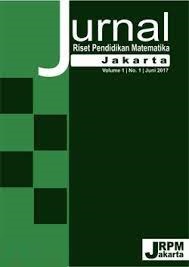Analysis of Socio-emotional Development in Mathematics Learning Through Multi-representative Based Test Instruments
Analysis of Socio-emotional Development in Mathematics Learning Through Multi-representative Based Test Instruments
DOI:
https://doi.org/10.21009/jrpmj.v6i1.29022Keywords:
socio-emotional Development, Mathematics Learning, Multirepresentative Based Test InstrumentAbstract
This article examines social-emotional development in mathematics learning through a systematic literature review. The formulation of the problem in this study is as follows: How does the development of social-emotional awareness in literature take place? What are the students' social-emotional characteristics? What difficulties might students with low social-emotional levels encounter when learning math? context for observing students' social-emotional development. The results of this study show that social-emotional development in literature achieves students' social-emotional development in learning, specifically students show attitudes of interest, participation, and communication. Communication, interaction, ability to work in groups and independently. confidence, but the points he has not achieved are calmness, difficulty adapting, privacy and difficulty communicating with people he considers strangers. Achieve students' social-emotional development outside of school hours, i.e. students show empathy, care, help friends, are not selfish and know how to control emotions when interacting and having fun , while what hasn't been achieved is just playing with close friends , less achieved. Pay attention to what's going on around you, speak only when necessary, and prefer learning to playing.
References
Aulia, L., ismet, ismet, & zulherman, zulherman. (2016). Pengembangan Instrumen Tes Berbasis Multirepresentasi Pada Mata Kuliah Pendahuluan Fisika Zat Padat. Jurnal Inovasi Dan Pembelajaran Fisika, 3(1), 45–51
Caballero, M., & Llorent, V. J. (2022). The effects of a teacher training program on neuroeducation in improving reading, mathematical, social, emotional and moral competencies of secondary school students. A two-year quasi-experimental study. Revista de Psicodidáctica (English Ed.), 27(2), 158–167. https://doi.org/10.1016/j.psicoe.2022.04.002
Devis-Rozental, C., & Farquharson, L. (2020). What influences students in their development of socio-emotional intelligence whilst at university? Higher Education Pedagogies, 5(1), 294–309. https://doi.org/10.1080/23752696.2020.1820887
DIA,Taşkı. Aygün, (2016) "Öğretmen Adaylarının Gözüyle Sosyal-Duygusal Öğrenmenin Önemi (dalam bahasa Turki). Mersin Üniversitesi Eğitim Fakültesi Dergisi," Mersin Üniversitesi Eğitim Fakültesi Derg.,
G, Andi Lely Nurmaya, dkk. 2022. Analisis Perkembangan Perilaku Sosio-Emosional Siswa dalam Pelaksanaan Pembelajaran Secara Daring (Online) di Sekolah Dasar. Jurnal Basicedu,Vo. 6, No. 1, hlm 943-953.
Irwandani, I. (2014). Multi Representasi Sebagai Alternatif Pembelajaran Dalam Fisika. Jurnal Ilmiah Pendidikan Fisika Al-Biruni, Vo. 3, No. 1, hlm 39–48.
Mänty, K., Järvenoja, H., & Törmänen, T. (2020). Socio-emotional interaction in collaborative learning: Combining individual emotional experiences and group-level emotion regulation. International Journal of Educational Research, 102(June), 101589. https://doi.org/10.1016/j.ijer.2020.101589
Näykki, P., Isohätälä, J., & Järvelä, S. (2021). “You really brought all your feelings out” – Scaffolding students to identify the socio-emotional and socio-cognitive challenges in collaborative learning. Learning, Culture and Social Interaction, 30(June). https://doi.org/10.1016/j.lcsi.2021.100536
Nisa, A. R., Patonah, P., Prihatiningrum, Y., & Rohita, R. (2021). Perkembangan Sosial Emosional Anak Usia 4-5 Tahun: Tinjauan Pada Aspek Kesadaran Diri Anak. Jurnal Anak Usia Dini Holistik Integratif (AUDHI), Vol. 4, No.1, hlm 1.
Nurjannah, N. (2017). Mengembangkan Kecerdasan Sosial Emosional Anak Usia Dini Melalui Keteladanan. HISBAH: Jurnal Bimbingan Dan Konseling Dakwah Islam, Vol. 14, No. 1, hlm 50–61.
Tusyana, E., Trengginas, R., & Suyadi, S. (2019). Analisis Perkembangan Sosial- Emosional Tercapai Siswa Usia Dasar. Jurnal Inventa, Vol. 3, No. 1, hlm 18–26.
Zamroni, (2015) “Pengembangan Sistem Penilaian Pendidikan yang menerapkan KBK dalam menyusun Otonomi Daerah,”




